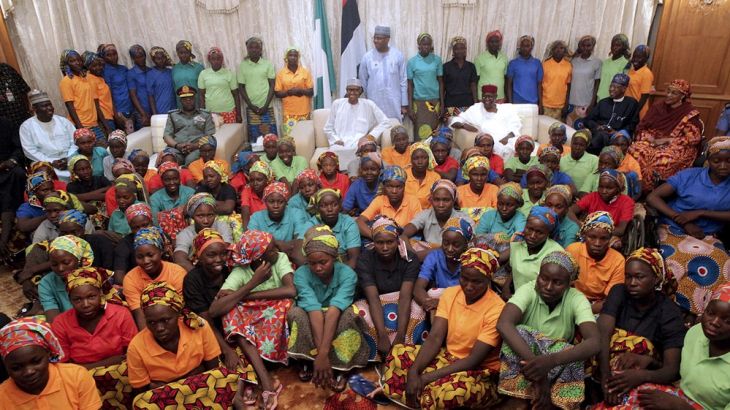Muhammadu Buhari vows support for freed Chibok girls
Nigeria’s president pledges to ensure the 82 girls’ ‘health, education, security, and general well-being’.

A group of 82 girls held captive for three years by Nigeria’s Boko Haram have met Nigerian President Muhammadu Buhari in the capital Abuja on Sunday, a day after they were released in a prisoner swap.
“I cannot express in a few words how happy I am to welcome our dear girls back to freedom,” Buhari told the girls at his residence, according to a statement by his office.
This evening I received 82 of our daughters, who have just regained their freedom after three years in Boko Haram captivity. pic.twitter.com/fy6pEXAOZx
— Muhammadu Buhari (@MBuhari) May 7, 2017
The girls were among a group of more than 200 schoolgirls kidnapped by the armed group Boko Haram, which has waged an eight-year insurgency against the Nigerian government.
Buhari vowed help to the girls, pledging to “personally supervise” authorities charged with ensuring the girls’ “health, education, security and general well-being”.
The 45-minute meeting was held shortly before Buhari left for London for a medical consultation amid concerns over his health, according to his spokesman Femi Adesina, who said the girls had now been “handed over to those who will supervise their rehabilitation”.
Al Jazeera’s Ahmed Idris, reporting from Abuja, said: “A lot of people are happy, a lot of people are excited. But there is also anxiety … Everybody hopes that his or her daughter is part of the 82 who’ve come home now.”
|
|
Anxious for good news
This is the largest release since Boko Haram fighters stormed a secondary school in Chibok in northeastern Nigeria in April 2014 and seized 276 teenaged girls who were preparing to sit high school exams.
Before Saturday, more than 80, including 21 whose release was negotiated in October 2016, had been freed.
The Chibok girls have become a symbol of the Nigerian conflict.
Enoch Mark, a Christian pastor whose two daughters were among the kidnapped, said of the latest releases: “This is good news to us. We have been waiting for this day. We hope the remaining girls will soon be released.”
It was not clear if his daughters were among those freed.
The Nigerian government said it was committed to securing the release of all hostages held by Boko Haram.
“The president has said that as many of the girls are alive, his administration will strive to get them back,” Adesina told Al Jazeera.
“So 21, and 82 now, plus three that were recovered by the military, till the very last of the girls are recovered, the Nigerian government will stay on the matter.”
READ MORE: Father of Chibok girls, 3 years on – ‘I lost my peace’
Aisha Yesufu of the Bring Back Our Girls campaign said the freed girls require rehabilitation and trauma counseling.
“It’s not just to bring them back home, we must ensure that they get the education they are supposed to have,” she said.
“It is time for them to be reunited with their families. Psychosocial therapy … there has to be rehabilitation. And at the end of the day, we want to have world leaders out of every one of them so that they can be what the terrorists did not want them to be.”
In a statement, the UN children’s agency said it was heartening that the girls would finally be reunited with their families after so long.
“They will face a long and difficult process to rebuild their lives after the indescribable horror and trauma they have suffered at the hands of Boko Haram,” said Pernille Ironside from UNICEF Nigeria.
“UNICEF calls on Boko Haram to end all grave violations against children, especially the abduction of children and the sexual abuse and forced marriage of girls.”
Boko Haram has used kidnapping as a weapon of war, seizing thousands of women and children, and forcibly recruiting young men and boys into their ranks.
In a less publicised attack in November 2014, some 300 children were among about 500 people kidnapped from the town of Damasak, on the border with Niger, in the far north of Borno state. Most are still missing.
Boko Haram’s eight-year uprising has killed more than 20,000 people and driven 2.6 million from their homes.
The Nigerian government has claimed that Boko Haram has been defeated, but the armed group continues to stage attacks in the northeast, often using child suicide bombers.